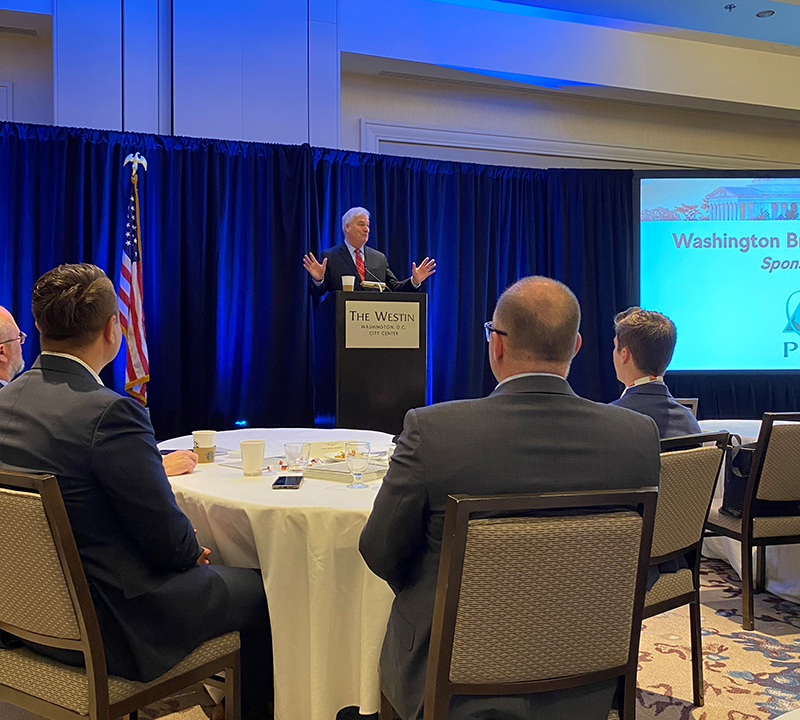
The Window & Door Manufacturers Association Spring Meeting & Legislative Conference was held lApril 1-2 in Washington, D.C. The advocacy meeting welcomed insights from Andrew Desiderio, senior Congressional reporter for Punchbowl News, as well as from Republican leaders Rep. Gabe Evans of Colorado and Rep. Tom Emmer of Minnesota, who also serves as the U.S. House Majority Whip.
Speakers focused on major issues affecting industry, including tariffs and tax policy. Desiderio described the beginning of Trump’s second term as one of the most “volatile periods in Washington that [he] has covered in the last 10 years, with the exception of the early onset of the pandemic,” largely due to the recently enacted tariffs.
Republican leaders warned against judging the president’s tariff strategy too soon. “Keep in mind what happened when he was first in office [during his first term],” said Rep. Emmer. “Markets went down. We had the same kind of disruption. … What I'm going to tell you is [the markets] went down, and when the policy started to take effect, [markets] took off, and we had the best economy the world has ever seen before it shut down with the pandemic.”
Trump likely to remain consistent on tariffs as a strategy
The conference took place the day before, and the day of,“Liberation Day” April 2 when President Trump announced reciprocal tariffs on more than 180 countries, while also adding baseline tariffs against others.
The actual amount of tariffs remained a secret up until the announcement on April 2, but presenters at the conference spoke to the permanence of the administration using tariffs as a trade strategy. “My sense based on what I'm hearing from Republicans who talk to him regularly, is that despite the exemptions that might come, or the delay of implementation, Trump is full steam ahead on this strategy,” said Desiderio. He said that the administration is using tariffs as a tool to transform the U.S. economy back into a manufacturing-based economy, and felt it was unlikely that Trump would face much pushback from Congressional Republicans.
Robert DeFrancesco, a partner at Wiley that specializes in international trade, echoed Desiderio’s belief that the tariffs are designed to bring the supply line back to the U.S. in a presentation providing historical context to U.S. tariff strategy. He urged attendees to read the administration’s America First Trade Policy Memo to get a better understanding for current and future trade policy.
DeFrancesco emphasized that some of the current tariffs are designed to be temporary, including the tariffs based on the International Emergency Economic Powers Act and the reciprocal tariffs that are being enacted. “So, [the tariff] will move if the other countries move, if the other countries don't, then it'll stick around longer,” he explained. However, “the 232 tariffs are much more permanent and not going to move as much, if at all,” he added, referring to the tariffs levied on imported steel and aluminum.
Administration working to make Trump Tax Cuts permanent
The 2017 Tax Cuts and Jobs Act will expire at the end of the year, and the administration is working to both extend them, and possibly make the policy permanent.
While some of the provisions for small businesses have expired, Desiderio said that Republicans have indicated they want to extend all of them as part of the new tax package. He said that this budget reconciliation process is likely to be difficult because it will have to be deficit neutral, meaning the administration will have to cut spending by the same amount that they are cutting taxes.
Additionally, Congressional Republicans are looking to address the debt ceiling as part of this new package, which could prove risky, Desiderio says, because it moves the deadline for approval up by a couple months. “Current estimates say that once we hit June and July, the U.S. government will likely hit its borrowing limit, requiring Congress to take action to lift that borrowing limit,” he explained, and that defaulting on our debt would cause “economic calamity.”
Adding to the complexity is that Congressional Republicans are working to make the tax cuts permanent, Desiderio said. To do that, they are arguing that extending the current tax policy does not require reconciliation, as the cost of extending an existing policy would be zero. According to developments as of April 1, Desiderio said Republicans were planning to vote on a budget resolution, a kind of legislative “shell,” which will be sent to the House, after which they planned to write the legislation. He describes this as a “risky” strategy given that the Senate Parliamentarian, who adjudicates rules in the Senate, could deny their request as not in accord with reconciliation rules.
As of this writing, Senate Republicans had adopted a budget resolution as of April 5.


